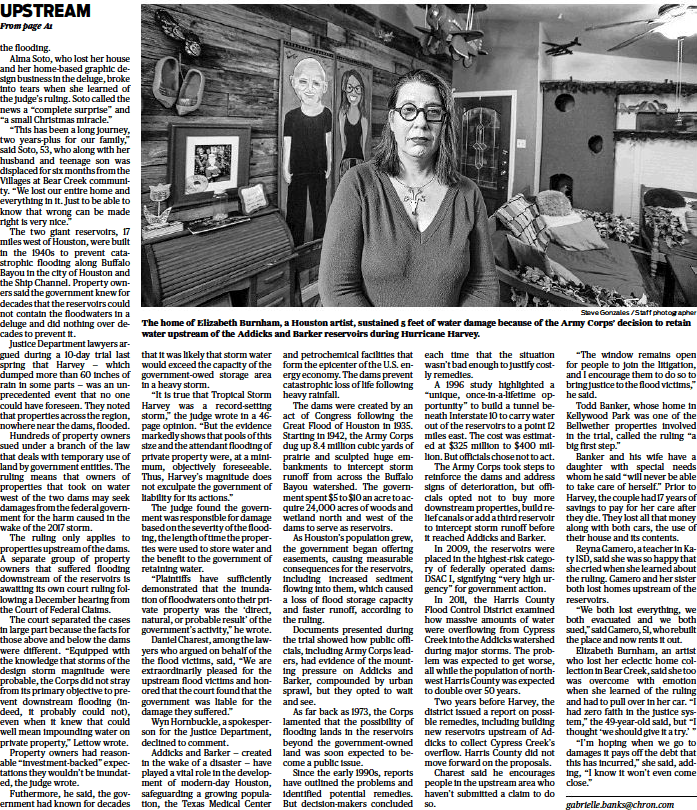Zero Faith
“I had zero faith in the justice system, but I thought we should give it a try.” Those are the words of Elizabeth Burnham, a homeowner who lost everything in Hurricane Harvey flooding after she was informed she had won her lawsuit against the U.S. Corps of Engineers. Ms. Burham and other homeowners were flooded during Hurricane Harvey when the U.S. Corps of Engineers decided to retain floodwaters upstream of the federally owned and managed Addicks and Barker reservoirs. We’ll get to the case in a moment, but I was struck by this lady’s lack of trust in our judicial system to correct a wrong. Bearing in mind the newspaper story does not tell us anything about this lady’s life experiences or her politics or really anything at all beyond the fact she lost everything, but there is something sad about the fact that an ordinary person had “zero faith in the justice system.” One has to wonder what has led her and maybe even most Americans to lose faith. It’s a really big question without a short, neat, quick, easy answer.
My family once gave me a hand-painted sign meant to look like antique. It is the sort of sign a lawyer officing on a town square might have hung outside the office to attract clients. It says: Fred Davis, Attorney at Law, Dedicated to the relentless pursuit of protecting your legal rights amidst the unending maelstrom of injustice.” I suspect that Ms. Burnham has personally experienced or witnessed what she perceives to be an unending maelstrom of injustice, but for whatever reasons, our judicial system was likely to fail her.
If I could prescribe just a few antidotes to this generally held pessimism, they would be greater access to competent legal services; cheaper, faster access to the courts to resolve disputes; and, taking politics out of judicial selection.
We rightly complain about affordable access to healthcare, but affordable access to legal help is just as bad. Also, access to our civil courts is expensive and far beyond the means of an average wage earner. Our society does almost nothing to address either of these issues and the end result is a perception that only the rich and corporations have meaningful access to justice. Unfortunately, that perception is often correct, but fortunately for Ms. Burnham, her case was one that attorneys could accept on a contingent fee basis and her case was one of a large group of similar cases which could be handled by the attorneys simultaneously so litigation expenses could be shared. Had Ms. Burnham been the sole client suing the Corps of Engineers, there is no way her case, by itself, would have been economically viable. The cost of the litigation would have far exceeded the value of her damages.
Politics in the selection or election of judges has had a corrosive effect upon the public’s faith in the judicial system. When political parties brag about remaking the judiciary in their own image and judges running for office tout their political affiliation, at least half of the public has good reason to doubt the impartiality of judges.
Back to the verdict. The judge found that the Corps’ action in not releasing flood water downstream caused the reservoirs to hold more flood waters than they were designed to carry and, consequently, flooded the upstream homeowners. The judge ruled that flooding the homeowners was a foreseeable result of the Corps’ decision. The judge ruled that flooding the homeowners’ property constituted a “taking” of their property without just compensation in violation of the Fifth Amendment. The Corps argued that Harvey was a historic event and not foreseeable and that it was not possible to release water downstream without flooding the downstream people, i.e., they had no choice or any choice they made was wrong. The judge did not assess damages. Another trial will determine damages.
The cases of the downstream property owners will be tried next.
Of course, there will be appeals and it is entirely possible that Ms. Burnham’s lack of faith in the judicial system will ultimately prove to be justified.
One of the interesting things about the case is the long, long history of flood control problems, proposed solutions, bad misjudgments, missed opportunities, and failures in the Houston area. I was not fully aware of the history. People have been seeing a catastrophe coming down the road for a long time and the problem is not only unsolved, it’s probably getting worse. The Houston Chronicle story of December 18, 2019 regarding this case does an excellent job of discussing the problematic history (See article below).
Article is property of the Houston Chronicle and Houstonchonicle.com / December 18, 2019 print edition

